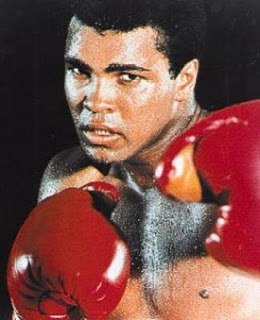Muhammad Ali Biography
Cassius Marcellus Clay Jr. was born on January 17, 1942, in Louisville, Kentucky. The elder of two boys, he was named after his father, Cassius Marcellus Clay, Sr., who was named for the 19th century abolitionist and politician of the same name. His father painted billboards and signs, and his mother, Odessa Grady Clay, was a household domestic. Although Cassius Sr. was a Methodist, he allowed Odessa to bring up both Cassius and his younger brother Rudolph "Rudy" Clay (later renamed Rahman Ali) as Baptists. He is a descendant of pre-Civil War era American slaves in the American South, and is predominantly of African-American descent with Irish and English ancestry.
Cassius Marcellus Clay Jr. was born on January 17, 1942, in Louisville, Kentucky. The elder of two boys, he was named after his father, Cassius Marcellus Clay, Sr., who was named for the 19th century abolitionist and politician of the same name. His father painted billboards and signs, and his mother, Odessa Grady Clay, was a household domestic. Although Cassius Sr. was a Methodist, he allowed Odessa to bring up both Cassius and his younger brother Rudolph "Rudy" Clay (later renamed Rahman Ali) as Baptists. He is a descendant of pre-Civil War era American slaves in the American South, and is predominantly of African-American descent with Irish and English ancestry.
Clay was first directed toward boxing by the white Louisville police officer and boxing coach Joe E. Martin, who encountered the 12-year-old fuming over the theft of his bicycle. However, without Martin's knowledge, Clay also began training with Fred Stoner, an African-American trainer working at the local community center. In this way, Clay could make $4 a week on Tomorrow's Champions, a local, weekly TV show that Martin hosted, while benefiting from the coaching of the more experienced Stoner, who continued working with Clay throughout his amateur career.
Under Stoner's guidance, Cassius Clay won six Kentucky Golden Gloves titles, two national Golden Gloves titles, an Amateur Athletic Union National Title, and the Light Heavyweight gold medal in the 1960 Summer Olympics in Rome. Clay's amateur record was 100 wins with five losses.
Ali states (in his 1975 autobiography) that he threw his Olympic gold medal into the Ohio River after being refused service at a 'whites-only' restaurant, and fighting with a white gang. Whether this is true is still debated, although he was given a replacement medal at a basketball intermission during the 1996 Olympics in Atlanta, where he lit the torch to start the games.
Under Stoner's guidance, Cassius Clay won six Kentucky Golden Gloves titles, two national Golden Gloves titles, an Amateur Athletic Union National Title, and the Light Heavyweight gold medal in the 1960 Summer Olympics in Rome. Clay's amateur record was 100 wins with five losses.
Ali states (in his 1975 autobiography) that he threw his Olympic gold medal into the Ohio River after being refused service at a 'whites-only' restaurant, and fighting with a white gang. Whether this is true is still debated, although he was given a replacement medal at a basketball intermission during the 1996 Olympics in Atlanta, where he lit the torch to start the games.


COMMENTS :
0 comments to “Muhammad Ali”
Post a Comment